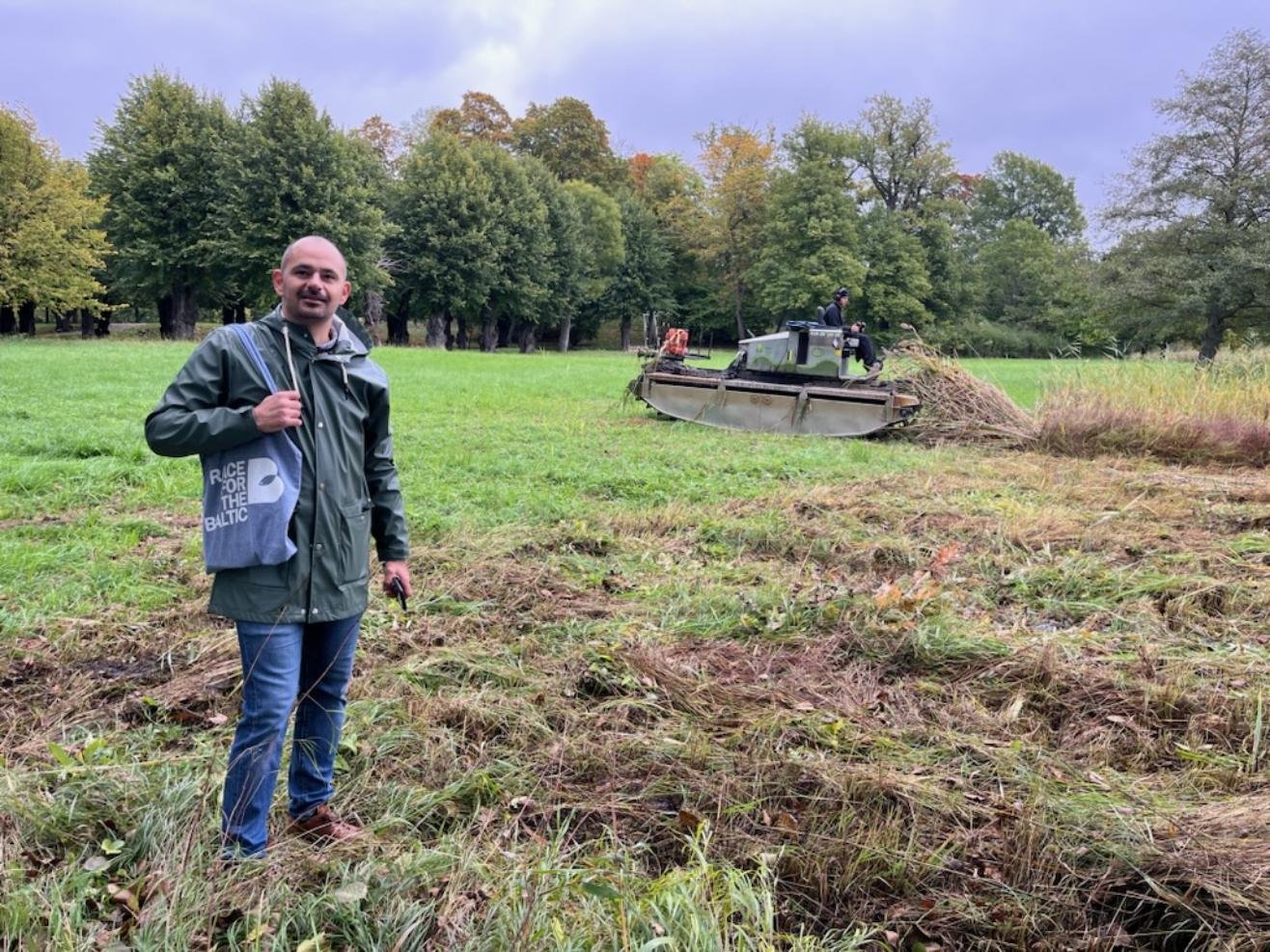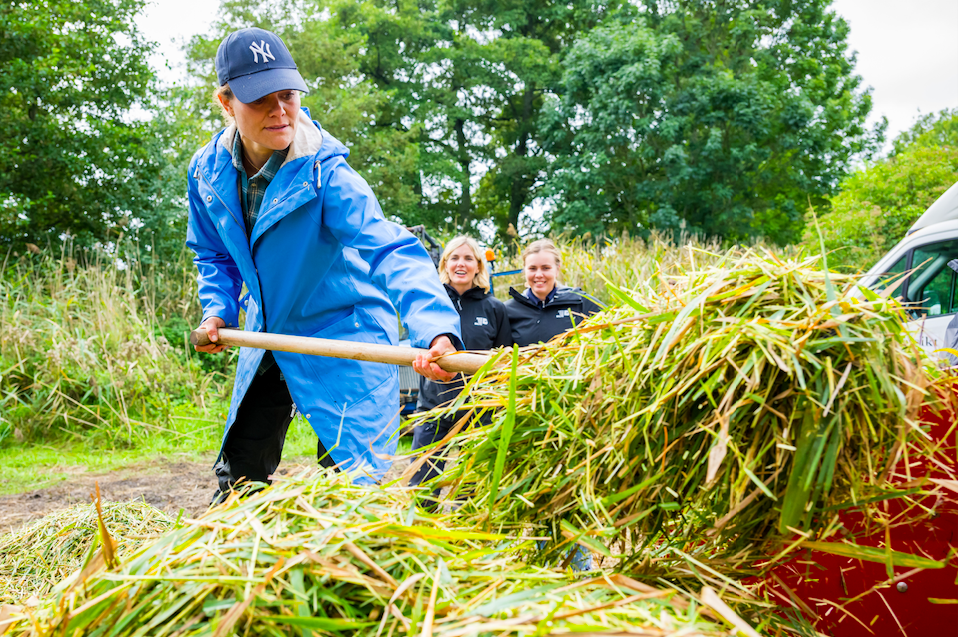BalticReed: creative usage and collaboration for reed management
Together with sustainable building initiative Werstas Petraamo and John Nurminen Foundation, RFTB co-arranged a workshop in Helsinki on reed building materials in March. In February RFTB met with experts and key stakeholders at Lake Tåkern nature reserve. During February and March students at Konstfack, University of Arts, Crafts and Design have been working with reed as part of Industrial Design Course.
BalticReed: Study trip to Estonia and new reed project in Kalmar
In Q4 we co-arranged a study trip to Estonia, focusing on reed as a sustainable building material. Together with architects, thatchers, harvesters, and entrepreneurs from Sweden, Finland, Denmark and Estonia. Reed has been utilised in construction for centuries, and visits like these are an important step in preserving and sharing knowledge and expertise. In December RFTB organised a conference exploring reed as fodder together with SLU and Axfoundation. The day was full of knowledge sharing, inspiration, solution-oriented discussions and rendered a number of concrete actions. Together with Kalmar, RFTB will be launching a parallel reed project starting in Summer 2025. Around 50 hectares of reed will be harvested (both summer and winter). Also, the BalticReed project group released a project film that has been in production for the last few months.
Konferens: Vass från Östersjön – Framtidens Foder för Hästar och Kor
En heldag om vassfoder organiserad av Race For The Baltic, Sveriges Lantbruksuniversitet (SLU) och Axfoundation. Dagen kommer att äga rum på Axfoundation, i centrala Stockholm.
Fokus kommer att vara på användningen av vass som ett hållbart foder för hästar och nötkreatur. Dagen samlar aktörer från hela värdekedjan, inklusive experter, branschledare, skördare och entreprenörer, för att dela insikter, erfarenheter och strategier för att främja en innovativ och hållbar foderproduktion.
Reed Harvesting, Product Development and Investors workshop
RFTB harvested a total of 15 hectares of reed during July and August, the reed was mainly used as horse fodder and soil improvement. It was an important step in establishing proof of concept for reed-based soil as well as building capacity and market demand for reed-based horse fodder. Furthermore, in August the BalticReed project- and steering group convened in Mariehamn Åland Islands, to host a dynamic workshop where entrepreneurs, researchers, and financiers explored innovative approaches to utilising reed as a raw material in different purposes.
Driving reed-based soil solutions forward
Together with Axfoundation we hosted a dynamic roundtable at Torsåker Farm, exploring reed as a sustainable soil improvement alternative. Stakeholders, including researchers and entrepreneurs, discussed investment needs, logistics, and innovative business models for reed-based soil. Additionally, a workshop was held in Helsinki with the John Nurminen Foundation, which brought together experts to support reed harvesters and enhance value chain efficiency. This summer, RFTB will harvest reed in Vaxholm and Norrtälje, collaborating with Skärgårdsstiftelsen, Statens Fastighetsverk, and Vaxholm municipality.
BalticReed: Project partner meeting and mapping of harvesting sites
RFTB hosted a two-day project partner meeting in Stockholm, with internal workshops at Boston Consulting Group, a study visit to RISE Research Institutes of Sweden, which highlighted innovative methods of transforming reed into sustainable packaging solutions. The following day, a seminar focused on the untapped potential of reed-based value chains, was held at Mannheimer Swartling. A recording from the seminar can be found here. Together with partners, potential reed harvesting sites have been identified for the harvest, which is planned for summer ‘24. Additionally, a survey has been distributed to Swedish municipalities along the Baltic Sea coast, aiming to gather data on local reed harvesting practices.
BalticReed: Successful harvest, royal visit, and project kick-off
RFTB collaborated with Vaxholm municipality, Sjöutsikt, and SLU for a successful reed harvest in Vaxholm, the reed will be evaluated as animal fodder for cattle and horses. In connection to Baltic Sea Day HRH The Crown Princess made a field visit and got to experience the entire reed utilisation chain. In Helsinki, the project kicked off with partners discussing vital insights, emphasizing planning tools and reed harvesting techniques for coastal areas.
New project to our project portfolio: the Reed Project
There are many aspects to consider ranging from environmental impact from harvesting, commercial uses of reed to harvesting equipment. While there are many promising uses for reed, such as replacement of peat, straws, biochar, and fodder, ensuring their sustainability remains a challenge.
The project is set to begin this summer and will continue for three years. We are excited to keep you updated on our progress as we move forward.









